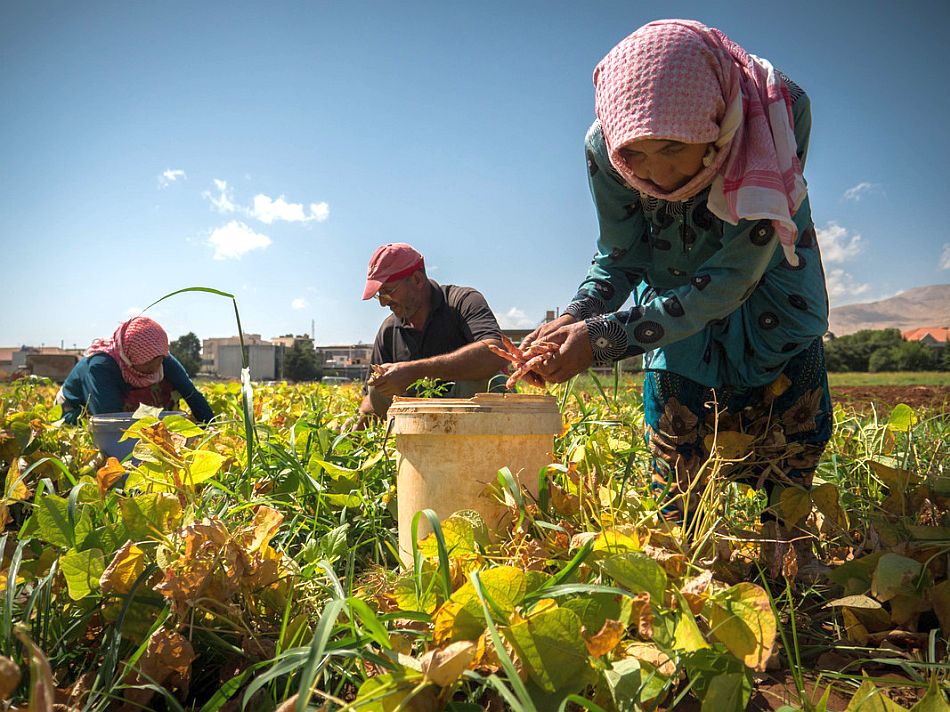IWMI-ReWater MENA supports the formulation of official standards for agricultural water reuse in Lebanon.

Dr. Marie-Helene Nassif, Dr. Nisreen Lahham and Lucy Lawrenson
Since 2018, IWMI has supported the Lebanese government to develop its water reuse policies through the ReWater MENA initiative. In partnership with the Lebanese Standards Institution (LIBNOR), the Lebanese Agricultural Research Institute (LARI), and several other public administrations, IWMI’s ReWater MENA has helped pave the way for the establishment of national water reuse standards.
Lebanon’s water crisis: water stress, local solutions and the need for official standards
When it comes to water, Lebanon is well-endowed in comparison to its neighbors. The country nonetheless faces water shortage problems - surface water is currently heavily exploited and groundwater supplies are in overdraft. The causes of Lebanon’s water crisis are complex: issues arising from high demographic growth, coupled with urbanization and decades-long agricultural expansion, are exacerbated by deeply rooted management shortcomings. Over time, the combination of these factors has led to high pressure on water resources which is felt throughout Lebanese society. Today, most of the country’s river basins are water-stressed and over-allocated, particularly during the summer months.
Agricultural water reuse from treated effluents can help reduce the water demand-supply gap. As a matter of fact, informal solutions are already being observed throughout the country. Many Wastewater Treatment Plants (WWTPs) are in water-stressed agricultural regions, and farmers living near these plants already tap into treated effluents to help meet local needs or reduce the costs of groundwater pumping. Furthermore, downstream farmers sometimes unintentionally reuse treated or untreated effluents discharged in waterways. While these informal practices may help mitigate Lebanon’s water shortages, they remain outside of an official strategy for water reuse. As highlighted by Lebanon’s updated National Water Sector Strategy (2020), the formulation of official water reuse standards will be vital to tap the potential of water reuse in the long-term. That’s where IWMI’s expertise can help.
IWMI, Lebanon and water reuse: bringing partners to the table
The project team knew that a successful initiative wouldn’t mean starting from scratch. Back in 2010, the Food and Agriculture Organization of the United Nations (FAO) produced guidelines on water reuse standards but those were not formally adopted by the government. Nine years later in 2019, ReWater MENA brought to the table representatives from the different administrations involved in the topic: The Ministry of Energy and Water, the Ministry of Environment and the Ministry of Agriculture, LARI (ReWater MENA’s main partner) and LIBNOR who was establishing a committee to develop new reuse standards. The different parties decided to revise and ratify the FAO guidelines as part of LIBNOR’s new initiative, placing them as one of the pillars of the ReWater MENA project in Lebanon. Building on IWMI’s participatory approach the committee gathered representatives from the different ministries, non-governmental institutions active in the field, academic institutions, and most importantly WWTP’s operators and lab technicians who have direct insights on local administrations’ resources and capacities. The team has since met regularly to bring their expertise and hands on experience to develop an adaptive regulation, although meetings were slowed down by the recent Pandemic and the tremendous impact of Lebanon’s financial collapse on the resources of public administrations.
On November 30th, 2021, ReWater MENA and LIBNOR co-organized a committee meeting to share ReWater MENA’s research findings and help take the discussion forward. Valuable insights included the suggestion from Dr. Marie-Helene Nassif, Lebanon’s ReWater MENA project coordinator, that the country might consider reducing standards’ stringency and allowing the irrigation of crops to be eaten raw, especially that these crops are widely practiced in areas with reuse potential as found in the project’s National assessment of Reuse potential (forthcoming). Dr. Nassif underlined that this is common practice as recommended by the WHO guidelines and has already been adopted by some MENA countries such as Morrocco. This recommendation was supported by the results of the soon- to-be-published LARI’s field trials, presented by Dr. Marie-Therese Abi-Saab, head of the LARI Water and Climate Unit.
Senior IWMI researcher and project leader of ReWater MENA, Javier Mateo-Sagasta, gave an overview of the WHO multi-barrier approach. This approach recommends relaxing the qualitative thresholds of treated effluents and implementing safety measures along the agricultural chain, such as on-farm irrigation and post-harvest practices. Mateo-Sagasta explained that this approach was developed for countries with limited financial and technological capacities, where treatment at the level of the WWTPs provides lower quality effluent.
The results were of interest for the different stakeholders, especially Suzy Hoayek, advisor of the Ministry of Energy and Water. Hoayek recommended replicating the field trials at other sites and presenting IWMI and LARI’s recommendations to larger audiences, including high-level officials who can support the standards’ ratification. Overall, the meeting was an important milestone for the work of the committee, who will build on these recommendations to finalize the revision of FAO water reuse guidelines and hopefully achieve updated standards that can confidently be presented for ratification.
Lebanon faces water shortage risks. But through the ReWater MENA initiative, IWMI and partners can help the Lebanese government mitigate these risks through research-informed policy, placing agricultural water reuse at the heart of Lebanon’s water management discussion.
